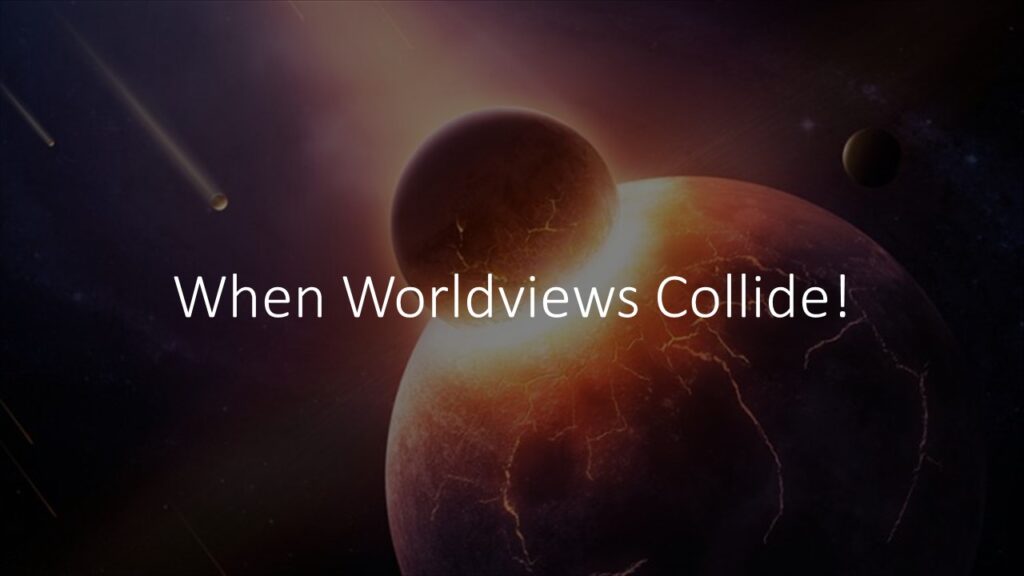
Listen to the podcast
When two physical objects try to occupy the same space at the same time, it typically doesn’t turn out well for either of them. It’s the stuff of fantastical disaster films, like “When Worlds Collide,” the 1951 Hollywood classic where a distant “rogue” star is on a collision course for Earth. The movie is Biblical in its proportions, and it even begins with quotes from the Book of Genesis where God declares his intention to destroy the world. General mayhem and destruction ensue, but finally a small portion of humanity is saved by escaping on a hastily built rocket ship. You can watch the trailer for this Hollywood epic below.
Great special effects are fun to watch, as are cheesy sci-fi films from the 1950s, but obviously the reality of such a calamity would not be fun at all, and hopefully this kind of catastrophe will continue to live on only on the silver screen for a long time. But we are facing now, in reality, a different kind of disaster: the collision of worldviews.
A worldview is the collection of underlying beliefs and assumptions about how the world works which is usually shared across a society. Different cultures around the globe may have different worldviews than the traditional worldview of western civilization. This might cause conflict, as it sometimes has throughout history, but since two different worldviews don’t usually occupy the same space, they aren’t automatically at odds with one another.
One example of colliding worldviews comes from 1 Kings, chapter 18. The Israelites have “forsaken the commandments of the Lord,” and have begun following the Canaanite god, Baal. God’s prophet Elijah asks them, “How long will you go limping with two different opinions? If the Lord is God, follow him; but if Baal, then follow him.” This results in a contest between Elijah and the priests of Baal to discover who is more powerful, God or Baal. Elijah of course wins the contest, but the priests run him out of town anyway. The two worldviews collided, and mayhem and destruction ensued.
Up until recently in America, the shared worldview has been a Judeo-Christian, biblical worldview, based on a belief in a supreme being who created an objective reality and provided a moral code. Obviously, there have been lots of variations on how these assumptions have played out, but even non-Christians have assumed the moral and ethical precepts of the biblical worldview simply because it permeated American Society.
But in the last half of the 20th century a different worldview has emerged and is gaining traction. The term most often used for this worldview is post-modernism, and it is based on the assumptions that:
- There is no God.
- Reality exists in perception only – there is no objective reality.
- Humanity on its own can create a perfect society
- Moral codes are relative but are typically oriented around opposition to many biblical moral codes.
We have ultimately ended up with two worldviews trying to occupy the same space, writing a new script that might well be called “When Worldviews Collide!”
For a while, Christians and other people of faith have tried to accommodate post-modernism, hoping that its utopian goals could be folded into a technique for kingdom building. But, just as many of the Israelites were seduced by the followers of Baal, too many Christians have watered down their faith in trying to adjust to a worldview that is ultimately antithetical to the Judeo-Christian biblical worldview. Worldviews have collided, and it’s not turning out well.
Of course, so many of us who are still attached to the biblical worldview are waiting for our leaders to tell us what to do. God sent Elijah to lead the Israelites out of their collision with Baal, but I wonder if in the aftermath of Christ’s resurrection God might just be saying to us, “I showed you what to do in the clearest possible terms. Return to me, and all will be well.” In other words, we are all Elijah, imbued with the Holy Spirit – the Spirit of Truth – and fully capable of defeating the priests of post-modernism.
In “When Worlds Collide,” Earth’s population devolves into chaos and anarchy when faced with annihilation. This might seem realistic, particularly since there was no way for most to escape the calamity. But I am reminded of the Moravian pietists on board the ship that carried John Wesley to America. In a huge storm, the ship began to founder, and Wesley was terrified. But the Moravians came on deck in the midst of the storm, took hands, and began to sing hymns. In the face of almost certain doom, they trusted God. It was a life-changing event for Wesley, which ultimately turned into a life-changing event for the world.
We too need to trust in God as we confront the modern-day priests of Baal, the prophets of post-modernism. Part of that trust is trust in the strength and confidence God granted us through Jesus Christ and the Holy Spirit. Confidence to speak the truth, and confidence that God will ultimately prevail, just as Elijah ultimately prevailed over Baal. And with that confidence we can do much better than a Hollywood disaster film, since we are called to saving rather than destroying.
0 Comments